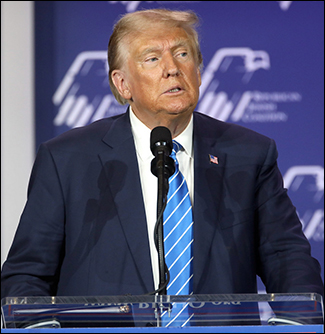By Jim Ellis — Thursday, Jan. 18, 2024
President

New Hampshire citizens at a town hall meeting at Hillside Middle School in Manchester. / Photo by Gage Skidmore
The ARG survey (Jan. 12-15; 600 likely New Hampshire Republican primary voters; 406 Republican voters; 194 Independent voters; live interview) sees former President Donald Trump and ex-UN Ambassador Nikki Haley now tied as the candidates turn the corner toward the Granite State primary on Jan. 23. Both candidates were drawing 40 percent support. Florida Gov. Ron DeSantis and now-ex presidential contender Vivek Ramaswamy were attracting only four percent apiece.
New Hampshire has been Trump’s weakest polling state among the pre-Super Tuesday primary and caucus entities. In the ARG polling series, Haley’s support has grown from 29 percent in their Dec. 20 survey to 33 percent in the Jan. 3 version, and now 40 percent. Trump, however, has also gained growing support indicated by his polling progression from 33, to 37, to now 40 percent.
ARG is the only pollster to show the race this close. The recent St. Anselm College, Emerson College, CNN/University of New Hampshire, and the Suffolk University/USA Today surveys project Trump with leads of 14, 16, 7, and 20 points, respectively.
The Democrats — The survey research firm also tested the Democratic presidential primary in a series of four polls beginning with their release on Dec. 20. The current study (Jan. 12-15; 600 likely New Hampshire Democratic primary voters; 452 Democratic voters; 148 Independent voters; live interview), finds US Rep. Dean Phillips (D-MN) posting his best standing against President Joe Biden. According to the results, Biden, clearly identified as a write-in candidate on the questionnaire, would lead Rep. Phillips 58-28 percent, with author Marianne Williamson drawing three percent.
Based upon ARG’s four-poll series, Phillips has consistently increased his support from 17 percent on Dec. 20 to 21, 26, and now 28 percent in the Jan. 15 poll. The congressman has been advertising heavily in New Hampshire. In those same polls, President Biden increased his share from 51 to 58 percent, but has remained stagnant in the two most recent surveys.
Other pollsters don’t see Rep. Phillips as strong. In data released Jan. 9 and 11, Suffolk University/USA Today projects the president holding a whopping 64-6 percent lead over Phillips. The CNN/University of New Hampshire ballot test results agree. They record a 69-7 percent Biden advantage. Within this group only the latest Emerson College poll finds Rep. Phillips breaking into double digits. EC calculates a 49-16 percent spread in the president’s favor.
Similar to Haley on the Republican side, Rep. Phillips actually leads Biden among the Independent voters who plan to participate in the Democratic primary according to ARG. The Independent/Democrats break 46-32 percent for Phillips. The registered Democrats support President Biden, 67-22 percent.
With the Jan. 23 New Hampshire primary looming, we shortly will see the impact of Biden choosing to bypass the state because the Granite State did not agree to the proposed Democratic National Committee primary calendar changes. Because of that decision, voters wanting to support the president must now write in his name on the ballot.
The question remains as to whether Haley and Phillips getting close to Trump and Biden in their respective primary races in New Hampshire would have much of an effect upon the national nomination campaign. Could the state be the starting point for new trends, or will more favorable challenger results only prove a blip on the path to convincing national primary victories for both President Biden and former President Trump?
Chances are good that the latter scenario will occur. New Hampshire results don’t tend to be particularly reliable national predictors. For the Republicans since 1976, the non-incumbent winner of the Granite State primary has gone on to win the GOP nomination just four times. For the Democrats, they too see only four of the New Hampshire winners carrying through to become the party’s national standard bearer.
At this point, particularly when looking at other state polls around the country, it appears that the New Hampshire results are more likely an outlier than a new trend setter. Even so, we may be primed to see some interesting results come Tuesday.







